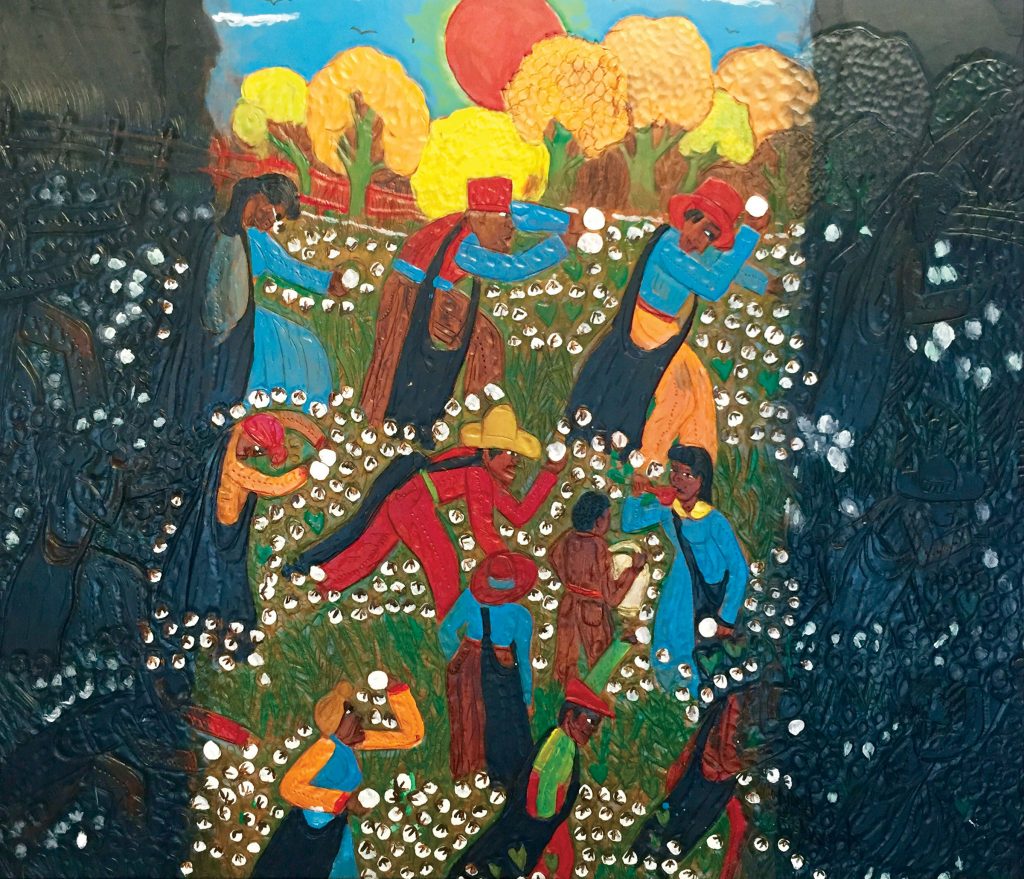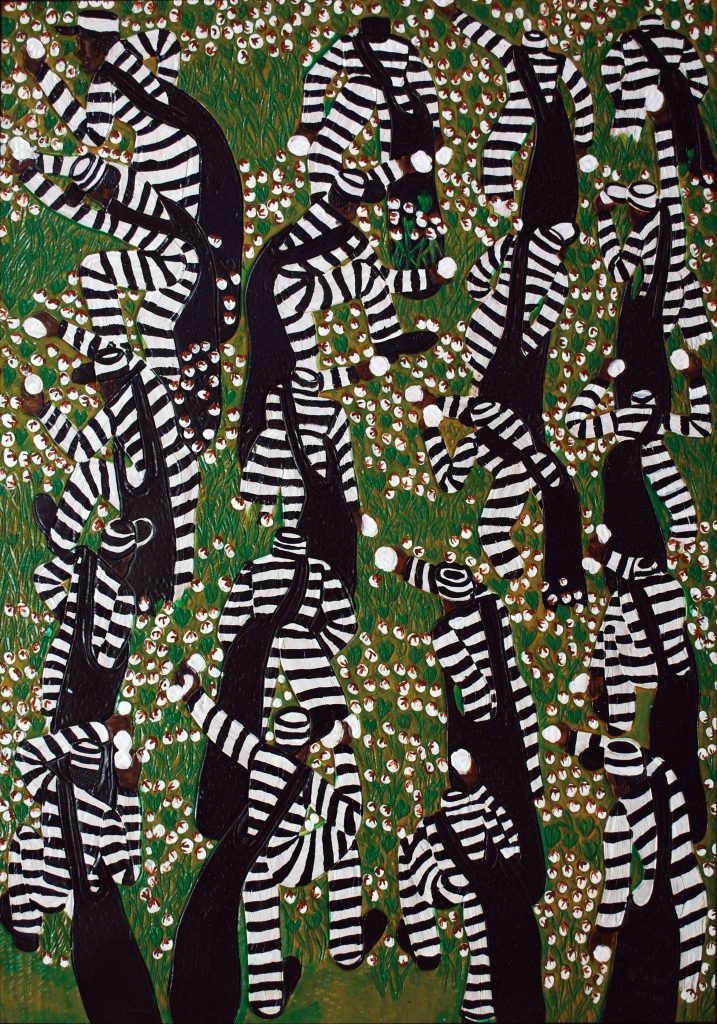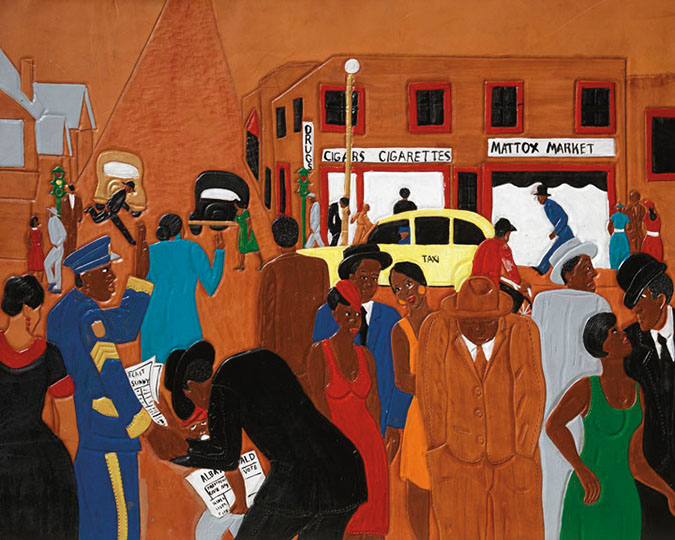Winfred Rembert grew up in the cotton fields. As a young boy, he worked picking cotton, making 50 cents to $1 in a day. Later in life, he returned to the backbreaking labor as a member of a prison chain gang. He said it’s important to him to document the stories of the cotton fields because they contain a history that many Black people don’t know about.
“Life was tough in the old days and I think today a lot of Black kids don’t know where they come from and don’t know the real history of their people,” Rembert said. “They might know that they were slaves, but they don’t know what it was to be a slave or to be a worker, a sharecropper. I’m telling the real story of the Black man and how he had to struggle in life.”
Rembert tells these stories through the medium of carved and dyed leather. His work is on display this month at the Muskegon Museum of Art, and Rembert will visit the museum on Feb. 8 for a reception in his honor and the showing of “All Me: The Life and Times of Winfred Rembert,” a documentary about his life.

Rembert learned to work with leather while in prison, thanks to a couple of fellow prisoners who taught him the skill.
He later combined this skill with his knack for storytelling and, at the age of 52, embarked on a career as an artist. He said his wife encouraged him one evening while he was sitting around the kitchen table with his kids sharing stories of life in the south.
Since embarking on his career as an artist, Rembert has garnered acclaim for his depictions of Black life and his lived experiences.
Rembert was born in 1945 in Cuthbert, Georgia. His aunt raised him after his mother left. He has said he grew up poor and without the benefit of much education, in part because of having to work at a young age.
By 16, he left school and joined the Civil Rights Movement. Rembert was arrested during a 1960s civil rights march while escaping from the threat of a lynching. During that time he was placed on a chain gang and spent his days once again picking cotton.

The history of the cotton fields is the history of many Black Americans and Rembert wants to make sure when he is gone, that history lives on, so despite deciding he wasn’t going to do anymore “cotton field pictures,” he continues to return to the fields, picking stories to share with the world.
“That was one of the things you can get from the cotton fields, stories that have never been told, not even in movies,” he said. “I know a lot of things that happened in the cotton fields that have never been told. I will probably never cover the entire story of the cotton field.”
He shared how one afternoon while working in the cotton field he witnessed a woman giving birth; only to return to picking cotton immediately after the baby wailed its first cries.
“I witnessed it,” he said. Those are the stories about Black life and struggles Rembert wants to be sure aren’t lost to history.
He draws from throughout his vast history, sometimes using vibrant, attractive colors to depict his feelings and other times choosing subdued dyes to share his stories.
Rembert said the inspiration for new work often comes from books or television.
“I probably be watching TV or reading a book that will remind me of something back in my childhood and then I get a picture in my mind from that, something I wasn’t thinking of, and I start a picture,” he explained.

He said one of his works on display at the Muskegon Museum of Art as part of the exhibit is “All Me,” which he said tells the story of how difficult life was on the chain gang.
“The reason it’s called “All Me,” when I was working on the chain gang, I felt like I had to be more than one person in myself to meet the demands of what they expected of you work wise. It was so hard.” He said he created “All Me” to reflect all these different people he had to be to survive the experience.
Rembert said leaving behind his leather canvases is important to him.
“I’m trying to send a message,” he said. “I don’t think people have heard the stories that I tell. I do them as pictures so when I’m gone, I’ll leave something for people to look at and that they’ve probably never heard of before.”
He added, “I think movies do a bad job of telling the truth about us. I’m going to leave something here for people to learn about. I’m 72 years old. I don’t know if I’ve got much life left.”
“Southern Roots: The Paintings of Winfred Rembert” is on display at the Muskegon Museum of Art through March 18. Over 25 works, including the premiere of several recent paintings by the artist, are featured in the exhibition.
An artist reception is being held on Feb. 8 followed by a screening of the documentary about Rembert’s life, “All Me: The Life and Times of Winfred Rembert,” The reception will start at 5:30 pm and the film will start at 7:00 pm. Rembert and the film’s director, Vivian Ducat, of Ducat Media, will participate in a Q & A following the film.
*Main photo by Howard Shapiro








Facebook Comments